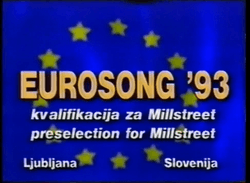Kvalifikacija za Millstreet
Kvalifikacija za Millstreet (English: Preselection for Millstreet; French: Présélection pour Millstreet) was the preselection for the Eurovision Song Contest 1993. Seven countries took part, none of which had participated in the Eurovision Song Contest before, although songs from Bosnia and Herzegovina, Croatia and Slovenia had represented Yugoslavia in past contests. Three qualified for the annual Eurovision in Millstreet, Ireland. It was held on 3 April 1993 at the RTV SLO Broadcasting Centre in Ljubljana, Slovenia. The presenter Tajda Lekše hosted the programme in English, French and Slovene.
| Kvalifikacija za Millstreet 1993 | |
|---|---|
 | |
| Dates | |
| Final | 3 April 1993 |
| Host | |
| Venue | RTV SLO Studio 1, Ljubljana, Slovenia |
| Presenter(s) | Tajda Lekše |
| Conductor | Petar Ugrin Mojmir Sepe (during the end credits) |
| Directed by | Peter Juratovec |
| Executive supervisor | Frank Naef |
| Executive producer | Edo Brzin |
| Host broadcaster | Radiotelevizija Slovenija (RTV SLO) |
| Interval act | Songs from the existing repertoire of each of the competing artists. |
| Participants | |
| Number of entries | 7 |
| Vote | |
| Voting system | Each country awarded 12, 10, 8–5 points to each song |
| Nul points | None |
| Winning song | "Tih deževen dan" |
After the seven competing songs were presented and the juries made their final results, the seven competing artists performed once again on stage, performing songs from their existing repertoire: Bosnia and Herzegovina's Fazla performed "Kiša ruši grad"; Put, who represented Croatia, performed "Mom zavičaju"; Estonia's Janika Sillamaa performed "I Live For Your Love"; Hungary's Andrea Szulák performed "Don't Wanna Stop My Clock"; Dida Drăgan for Romania sang "Blestem (The Curse)"; Slovenia's 1X Band performed "Novo jutro"; and Slovakia's Elán performed "Od Tatier k Dunaju".
From the seven competing countries, the former Yugoslav nations of Bosnia and Herzegovina, Croatia and Slovenia qualified for Eurovision 1993, which was held on 15 May 1993 in Millstreet, Ireland. Because of the new relegation system that had been introduced to Eurovision, all seven countries would be eligible to take part in the 1994 contest.
Organisation
Following the fall of the Iron Curtain and the dislocation of Yugoslavia, the number of countries wishing to participate in the contest grew strongly. For the second consecutive year, the European Broadcasting Union (EBU) expanded the maximum number of participating countries from twenty-three to twenty-five. As Yugoslavia was excluded, only the twenty-two other countries that participated in the 1992 edition of the competition immediately won a place in the final. The EBU decided that the last three places would be awarded through a preselection, which would be organized by Slovenian public television.[1]
Conductors
Each performance had an orchestra and conductor.[2] The second performances for the countries were performed without the orchestra, with some of them being playback. In Romania's second performance, George Natsis accompanied Dida Drăgan with a piano.
Results
| Draw | Country | Artist | Song | Language | Place | Points |
|---|---|---|---|---|---|---|
| 1 | Fazla | "Sva bol svijeta" | Bosnian | 2 | 52 | |
| 2 | Put | "Don't Ever Cry" | Croatian, English | 3 | 51 | |
| 3 | Janika Sillamaa | "Muretut meelt ja südametuld" | Estonian | 5 | 47 | |
| 4 | Andrea Szulák | "Árva reggel" | Hungarian | 6 | 44 | |
| 5 | Dida Drăgan | "Nu pleca" | Romanian | 7 | 38 | |
| 6 | 1X Band | "Tih deževen dan" | Slovene | 1 | 54 | |
| 7 | Elán | "Amnestia na neveru" | Slovak | 4 | 50 |
Interval
In order for the jury to complete the voting, each artist performed a second song from their repertoire. These performances did not count towards the points given by the jury.
| Draw | Country | Artist | Song | Language |
|---|---|---|---|---|
| 1 | Fazla | "Kiša ruši grad" | Bosnian | |
| 2 | Put | "Mom zavičaju" | Croatian | |
| 3 | Janika Sillamaa | "I Live For Your Love" | English | |
| 4 | Andrea Szulák | "Don't Wanna Stop My Clock" | Hungarian | |
| 5 | Dida Drăgan | "Blestem (The Curse)" | Romanian | |
| 6 | 1X Band | "Novo jutro" | Slovene | |
| 7 | Elán | "Od Tatier k Dunaju" | Slovak |
Score sheet
| Jury results | |||||||||
|---|---|---|---|---|---|---|---|---|---|
| Bosnia and Herzegovina | 52 | 5 | 8 | 10 | 10 | 7 | 12 | ||
| Croatia | 51 | 10 | 6 | 12 | 7 | 8 | 8 | ||
| Estonia | 47 | 6 | 8 | 8 | 6 | 12 | 7 | ||
| Hungary | 44 | 7 | 6 | 12 | 8 | 6 | 5 | ||
| Romania | 38 | 5 | 12 | 5 | 5 | 5 | 6 | ||
| Slovenia | 54 | 8 | 7 | 10 | 7 | 12 | 10 | ||
| Slovakia | 50 | 12 | 10 | 7 | 6 | 5 | 10 | ||
International broadcasts and voting
Voting and jury members
Each country sent a single juror, who was actually present at the contest venue. They announced their votes as the camera was trained on them.
.svg.png)
(Yugoslav representative in the 1976 Contest as part of Ambasadori)





Commentators
.svg.png)

.svg.png)







See also
References
- KENNEDY O’CONNOR John, The Eurovision Song Contest. 50 Years. The Official History, London, Carlton Books Limited, 2005, p.133.
- http://www.andtheconductoris.eu